Iran’s Exiled Prince Meets Former Israeli Defense Minister
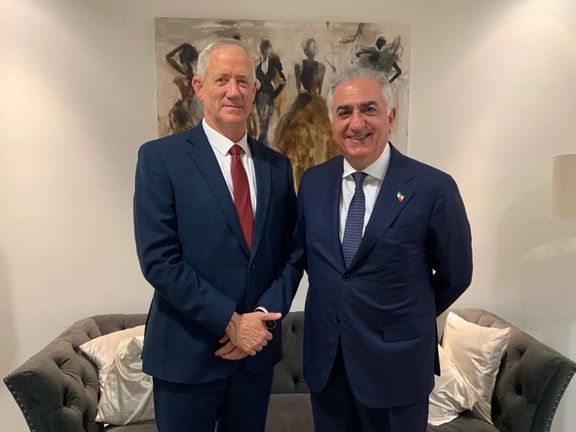
Iran’s exiled prince Reza Pahlavi has met with former Israeli defense minister Benny Gantz on the sidelines of the annual Jerusalem Post conference in New York.

Iran’s exiled prince Reza Pahlavi has met with former Israeli defense minister Benny Gantz on the sidelines of the annual Jerusalem Post conference in New York.
“We discussed the rich history between our peoples and the opportunities for future collaboration not only between Israel and a secular, democratic Iran but across the Middle East,” Pahlavi tweeted on Monday. “Together, let’s bring in a new era,” he said.
No further details have been released from the meeting between the two.
As Israeli Prime Minister Benjamin Netanyahu ramped up threats to attack Iranian nuclear facilities, the Iranian opposition figure, Pahlavi, seems to be a uniting point between the people of Iran and Israel.
Gantz who was in the previous Israeli government is also a strong opponent of the Iranian regime, its nuclear program and interventions in the region.
In April, Pahlavi toured Israel as part of his efforts to unite international support against the Islamic Republic and in support of the uprising in Iran.
During a press conference in Tel Aviv, Pahlavi said that Iranians are the extreme opposite of the country’s current rulers, and that the regime does not represent the Iranian nation. “They have no antagonism to any nation or any faith. I know that Iranians and Israelis see how important it would be for our future to be strategic partners, to work together, to address many issues. I come here to convey this message to Israeli citizens,” he said.
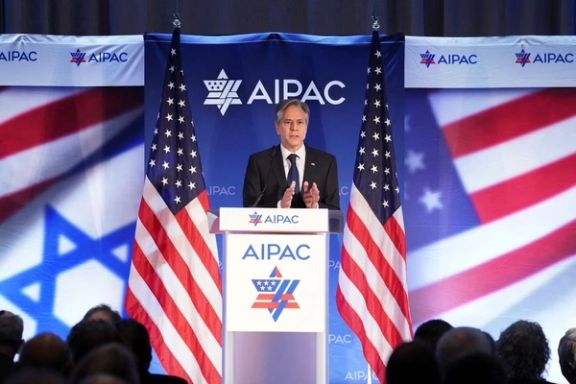
US Secretary of State Antony Blinken has reiterated that “all options are on the table” to prevent the Islamic Republic from acquiring a nuclear weapon.
In his address to the pro-Israel advocacy group AIPAC on Monday, he said, "If Iran rejects the path of diplomacy, then, as President Joe Biden has repeatedly made clear, all options are on the table to ensure that Iran does not obtain a nuclear weapon."
He did not elaborate on what Iran should do exactly that can be construed as rejecting the path of diplomacy as Tehran has been enriching uranium to over 60% purity and its proxy militia have attacked US forces in the region at least 83 times since 2021.
Admitting that there was no danger that Israel faces "that is graver than the one posed by the Iranian regime,” Blinken voiced Washington's "iron-clad" commitment to Israel's security.
“That regime routinely threatens to wipe Israel off the map, continues to provide weapons to terrorists and proxies like Hezbollah and Hamas, who reject Israel's right to exist,” he said, adding that the Islamic Republic “exports its aggression throughout and even beyond the region, including by arming Russian forces with drones that are being used to kill Ukrainian civilians and destroy its infrastructure.”
Blinken also highlighted the US “three-pronged approach of diplomacy, economic pressure, and deterrence, which also includes strengthening Israel's military capabilities,” saying that “it puts us in the strongest possible position to address the Iranian nuclear threat just as we take on the many other challenges posed by the Iranian regime.”
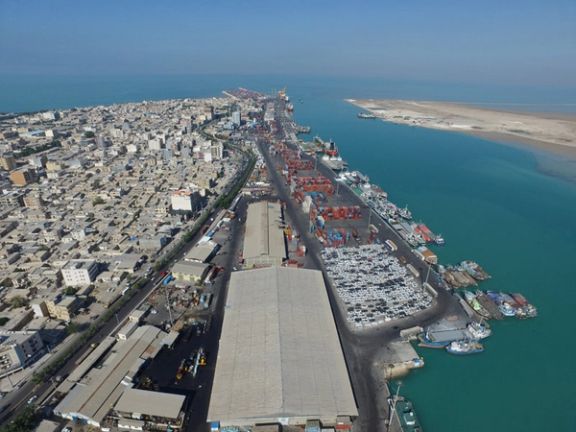
Based on Iran’s customs figures, the country’s non-oil exports to the European Union have dropped by 64% in the past 14 years.
These numbers show that Iran's non-oil exports to the European Union member countries have reached 725 million dollars in 2022, from about 2 billion in 2008.
According to the Navad-e Eqtesadi website, in addition to Britain's withdrawal from the European Union in 2020, the drop in Iran's exports to the European Union began after the withdrawal of the United States from the nuclear agreement in 2018.
Iran is also on FATF ‘blacklist’ for not adhering to several international financial conventions. The designation virtually cuts off the violators from the international banking system.
FATF is a Paris-based inter-state organization following the observance of international financial rules against money laundering and financing of terrorism.
European countries were supposed to trade with Iran through a special financial channel known as INSTEX, but the United Kingdom, France and Germany known as the E3 decided to shut down the mechanism, launched in 2019.
The INSTEX shareholders – Belgium, Denmark, Finland, France, Germany, the Netherlands, Norway, Spain, Sweden, and the UK – voted in favor of the dissolution at the extraordinary general assembly on March 9 considering Iran’s persistent refusal to engage with the facility.
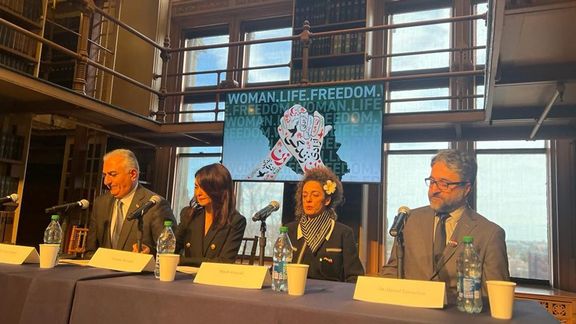
Documents hacked from Iran's presidential office show that the regime is keen to highlight discord among opposition figures abroad to weaken domestic dissent.
According to a confidential letter leaked by the hacktivist group ‘Uprising till Overthrow,' the deputy of the General Staff of the Armed Forces for cultural and propaganda affairs, Abolfazl Shekarchi, presented a list of measures to take to quell possible protests and strikes by teachers and workers.
In the letter dated April 30, it is apparent that the regime is rattled by protests and strikes and is trying to find ways to portray them as different from the widespread antiregime rallies. The document said rallies on teacher’s day and worker’s day are an opportunity for anti-regime demonstrations.
It also referred to the poisoning of schoolgirls, saying that Persian media abroad seek to portray the country as stricken by crises and in a state of emergency.
The recurring theme in the letter is that the regime wants to make the best use of the differences among different opposition camps and discredit the foreign-based media.
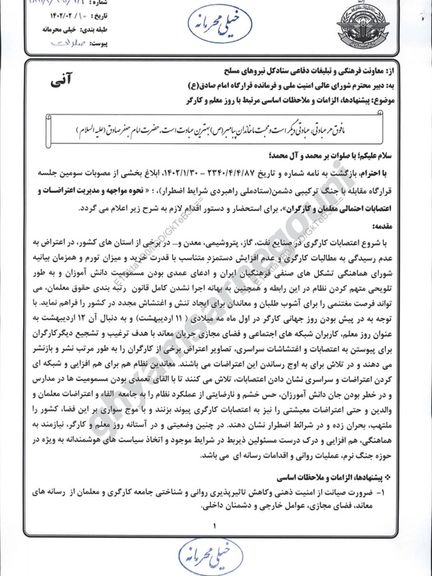
The letter also indicates that a large part of differences among opposition forces are accentuated by the supporters of the regime, known in social media as the cyber army.
One of the suggestions directly points to exaggerating the failure of the Mahsa Charterand the George Town alliance of opposition figures. A group of prominent Iranian dissident figures, which calls itself the Alliance for Democracy and Freedom in Iran, issued a Charter of Solidarity and Alliance for Freedom after announcing its existence in a February event at Georgetown University's Institute for Women, Peace and Security (GIWPS) -- titled ‘The Future of Iran’s Democracy Movement.'
The alliance fell apart following the resignation of Canada-based activist Hamed Esmaeilion and the ensuing arguments between monarchists and supporters of other forms of governments.
The leaked letter called on several regime organizations to try to highlight the differences among the different opposition forces and portray them as dependent on foreign “hostile” governments.
The document also called for delegitimizing teacher and worker activists by finding pro-regime experts among them and highlighting their views in state media outlets.
The hacktivist group ‘Uprising till Overthrow' claimed on May 29 that it breached 120 servers at the presidential office, getting access to internal communications, meetings minutes, President Ebrahims Raisi’s online conference platforms and about 1,300 computers inside the office.
In the new cyberattack, the group is said to have gained access to “tens of thousands confidential documents” but is releasing them in daily batches.
Earlier in May, the group, affiliated with the Albania-based opposition Mojahedin-e-Khalq (MEK) group -- People's Mojahedin Organization of Iran, hacked into the Islamic Republic’s foreign ministry servers, disabling 210 sites and online services and leaking another large batch of documents.

The Iranian regime says a female police officer who died after she defected from the force to express solidarity with protesters has suffered a cardiac arrest.
Mansoureh Sagvand is the latest such case to mysteriously die in the wake of detention. From the southern city of Abdanan, IRNA state news agency quoted officials from Ilam University of Medical Sciences who claimed her death was caused by cardiac and respiratory arrest.
The brave young woman posted her defection publicly on Instagram. Along with a photo of her in police uniform, she wrote: “I have been working as an honorary member of Khorramabad police force, but I will not have any cooperation with the armed forces and proudly stand with my fellow countrymen.”
The judicial and security authorities of Ilam are yet to provide an explanation about the "suspicious death". The regime also claimed that Mahsa Amini, whose death in morality police custody caused a nationwide uprising since September, died of a heart attack.
The Islamic Republic is disposing of and silencing its critics in ways including shooting them on the streets, executions, torture and psychological pressure.

US and UK navies acted when a merchant ship was being harassed by Iranian forces in the Strait of Hormuz, in a sign of a more forceful policy in the Persian Gulf.
The vessel sent a distress call on June 4 while transiting the straits, a relatively narrow waterway controlled in the north by Iran but considered international waters for commercial and naval traffic.
Iran has hundreds of fast attack boats that for years not only have harassed civilian vessels but, on many occasions, have come dangerously close to US and other warships in a show of force.
“The internationally flagged merchant vessel made a radio distress call at 4:56 p.m. local time while transiting the narrow strait. The civilian crew reported three fast-attack craft with armed personnel approached and followed the merchant vessel at close distance. The fast-attack craft were assessed to be from the Iranian Islamic Revolutionary Guard Corps Navy,” a US navy statement said.
US Navy guided-missile destroyer USS McFaul and UK Royal Navy frigate HMS Lancaster both received the distress call, and Lancaster launched a helicopter to provide surveillance. US 5th Fleet also directed a P-8A Poseidon maritime patrol aircraft to monitor the scene, the Navy said.

“The situation deescalated approximately an hour later when the merchant vessel confirmed the fast-attack craft departed the scene. The merchant ship continued transiting the Strait of Hormuz without further incident.”
It must be noted, however, that allied navies did not confront the Iranian forces, but simply "monitored" the situation. If fighter jets or attack helicopters had been dispatched, it would have sent a more forceful signal to the IRGC.
The incident followed Iran’s seizure of two commercial vessels in the Persian Gulf waters in May and an announcement by the US to send more naval forces to the region.
“[The] United States will not allow foreign or regional powers to jeopardize freedom of navigation through the Middle East waterways, including the Strait of Hormuz,” National Security Council Coordinator for Strategic Communications John Kirby told reporters on May 12, adding that there is “simply no justification” for Iranian actions to interfere, harass or attack merchant ships.
The Sunday incident also followed an announcement by the United Arab Emirates last week that it has pulled out of a US-led maritime coalition to provide security, which was later denied by the United States. However, Iran was quick to claim victory and announce that a new naval coalition is being formed with regional powers. The US also denied that claim, saying the Iranian statement “defies reason” as the Islamic Republic itself is the greatest threat to maritime security.
Sunday’s action, although not a direct naval confrontation, will reassure littoral countries that have relied on the West, and primarily on the United States, for security in the Persian Gulf.
The region contains some of the world's most important shipping routes where, in 2019, suspected Iranian attacks began against oil tankers amid tensions with the United States as the Trump administration imposed oil export sanctions on Tehran.
But Iran had long been harassing even US Navy vessels with its fast attack boat. The Obama, Trump and Biden administrations chose not to retaliate against Iranian naval provocations over the years or show a convincing military deterrent response.
As Saudi Arabia, the largest Arab power in the region shows signs of adopting a new policy of détente with Iran and close ties with China, the Biden administration feels it has to show that US security guarantees are important for the oil-rich Arab allies.
“US 5th Fleet remains vigilant and is bolstering defense around the key strait with partners to enhance regional maritime security and stability,” the US Navy said in its statement about the Sunday incident.